
‘In contemporary world, importance is given to one to one talks between two leaders rather than salutes of cannon, playing musical instruments , lunch and dinner, crowed with hue and cry and beautification of city and roads during the visit of the head of states. In order to make such a visit meaningful, presentation of the issue, understanding in evaluation, and trust between two leaders and countries remain important. Therefore, no one side should commit mistake in baffling each other in order to take such opportunity to a meaning conclusion. Since treaties and agreements are already decided through diplomatic channel, our Rt. honorable Prime Minister KP Sharma Oli’s attention should be focused to make talks with Chinese President Xi Jing Ping meaningful for the long term wellbeing of Nepal. In my experience Chinese dictionary does not have the word ‘no’ for a country that has trustworthy relations with China. How to make Chinese President’s Nepal visit meaningful depends on the diplomatic skill of the government of Nepal.’ One of the participants of the joint meeting of former Prime Ministers and foreign ministers summoned by Prime Minister KP Sharma Oli, Ramesh Nath Pandey has told that he has given warning advice through social media immediately after the meeting. Pandey is probably the only character in Nepalese politics who have witnessed activities of the rulers from the then Late King Mahendra to the recent republic era very closely. It will be better to view his expressions above prejudice or revenge.
In fact, whatever happens during this visit will be signed or agreed on the agenda decided prior to a month not in accordance to the suggestions collected before two days. Such discussions, no doubt, will provide moral power and support to the executive head, however, it is a serious question whether our bureaucracy and political mechanism have followed the talks between two leaders or merely given continuation to the tradition.
Chinese President Xi’s visit is taking place as his maiden visit after 23 years and after 4 years of the gossips of his possible visit. That’s why the information of Xi’s Nepal visit has cornered Dashain holidays and festive mood and discussions on it have begun in the country. It has been, no doubt, a good opportunity to make Nepal–China relations memorable among Nepalese people. Many people have curiosity to know about Xi’s visit and possible gift on behalf of the government of China for the prosperity of Nepal. It can’t be considered unnatural. Moreover, it will be more relevant to observe the circumstance and context of President Xi’s visit.
Changed Diplomatic Style of China

China which used to maintain neutrality in any country’s domestic or bilateral conflict citing internal affair is being appeared as more active and concerned in world political forum for the last five years. Defining differently the footprints of world powers that claim peace to be their main destination, China has been giving more importance to peace and stability of South Asia. Moreover, Belt and Road Initiative, BRI, has been a good diplomatic weapon these years. Chinese concern and bilateral collaboration in every sectors have been increasing in political changes and ups and downs of South Asian Countries like Nepal, India, Pakistan, Afghanistan, Sri Lanka , Bangladesh and Maldives. The trend of bilateral visits in these countries seems to be Beijing’s regular schedule.
Xi’s Activism Before Visiting Nepal
The proposed visit of president Xi to India on the second week of October for informal China- India summit talks had been publicized almost prior to two months. China had been minutely observing the drama performed during the 74th general Assembly of UN and the recent political decision taken by India on the issue of Jammu and Kashmir. Moreover, Indian foreign Minister had been to China to report firsthand the decision made by the parliament on Jammu and Kashmir to President Xi whereas, Pakistani foreign Minister had been to Beijing and sought for suggestion and support with Xi. Before leaving for Mamalpuram , India President Xi has hold bilateral talks with Pakistani President Imran Khan. Moreover, there have been Xi- Imran visits and talks thrice within 13 months of Khan’s succession to the power. Beijing is latently telling more things by cutting two days from India’s pre-scheduled visit and equalizing with Nepal. The main reason behind the reduction of the days is considered to be the recent decision of India to get mandatory approval of home minister and foreign minister in case any Indian institutions intend to collaborate with Chinese Academic institutions or Universities.
China in South Asia
Nepal
Nepal is the most unfortunate country in south Asia in terms of bilateral achievement despite it has the oldest relations with China although there is a continuation of Chinese initiation, cooperation and cordiality. Within six years of the bilateral relations established between Nepal and China in 1955 , the then Prime Minister Zhou En Lai had paid official visit of Nepal twice . After a long gap Chinese leader Deng Xiaoping had started his foreign visit from Nepal and given a good message to South Asia and the world about importance of Nepal for Beijing. Chinese President and Prime Minister had paid visit to Nepal in 1984 after six years. Panchayet system collapsed immediately after it. However, Chinese President Jiang Zemin had been to a three day official visit to Nepal in 1996. Coincidently, long-term people’s war had already been declared in accordance to the principle of Mao- Ze- Dong, hero of the Chinese revolution as Jiang Zemin landed to Kathmandu.
After the visit of Chinese Premier Li Peng in 1989 and Zhu Rongji in 2001 to Nepal, the high level visit from China seems to have come to full stop for more than a decade. Coincidently Wen Jiabao paid a transit visit to Nepal in 2012 after 12 years of the gruesome palace massacre. It will not be other wise to claim that Beijing woke up from a long slumber regarding Nepal after the promulgation of new constitution in 2015 and the rise of Nepal Communist party as a strong political power from the general election held in 2017. From that juncture the discussion on Chinese president’s visit had begun. The high level visit started with Tanka Prasad Acharya’s visit on behalf of Nepal took a good shape with the then King Birendra’s visit who visited China and discussed with head of the states 12 times. King Birendra ruled the nation for almost three decades, directly for 18 years and constitutionally for 11 years. But Prachanda could become the Prime Minister only for 17 months after he emerged in the power. He visited China officially and unofficially 7 times and became the first Nepalese leader to hold talks with Chinese head of the state 6 times. Moreover, it was a coincident that President Xi welcomed Prachanda to the Great Hall of the People as the first foreign guest from South Asia after he was elected as the President of China. At that time Prachanda was not the Prime Minister but the Chairman of the largest party of the Country.
Strategic importance with Nepal
Recollection of the fact that Nepal –China relation has always been special will be worth recollection rather than to mention it. Nepal has to pay a big price for its dilemma on BRI, a world project initiated by President Xi after his succession to the power. China does not direct any country as other countries do while shouting for the support preparing a proposal of its own project or policy. But Nepal due to its bad culture of Kathmandu of being directed by others , Nepal either could not understand the importance of BRI at its initial phase or didn’t prefer. After Nepal seriously faced Indian blocked, Nepal started to turn towards the north cautiously. Coincidently, present Prime Minister of Nepal was on the chair of Prime Minister in Singh Durbar at that time too. Only after that, moving far ahead of BRI , high sounding discussions on the train, fuel, and development from the north started to take place in Nepal. Despite the creation of ripple in the frozen pond of Nepal –China relations after KP Sharma Oli’s visit in 2016 as the Prime Minister of Nepal, it could not turn to happiness. The gesture of China though seemed to be different during the Prime Minister KP Sharma Oli’s visit as the representative of a powerful government and party appeared to be cold. Only after the official visit and commitment expressed Her Excellency President Bidhya Devi Bhandari at the beginning of this year , China became happy and the pending tasks miraculously proceeded. Xi’s Nepal visit should be considered as its highest gesture. It was deep longing and initiation of Nepal and an inseparable component of a greater plan of China to stand in world political forum uniting South Asia strategically along the path of development . For that sake China has a compulsion to keep India many times closer than Nepal and keep in regular touch with Islamabad, Dhaka, Colombo, Male and Thimpu. Moreover, Pakistan is the only strategic ‘ All Weather Friend’ of China in South Asia. However, the current changed context and political leadership in Islamabad might have been favorable for Beijing to extend the relations with another large country, India. However, tension seems to be increasing.
Nepal (NCP) and the Context of Communist Party of China(CPC)

The discussion on Nepal has been taken to the apex by Delhi and western media after CPC officially established brotherhood relations with NCP before the dawn of President Xi’s Nepal visit. This has also publicized the message of visit Nepal Year 2020. Moreover, there is certainly an intention to provoke CPN leadership. China might have been really happy to see the domination of CPN in Nepal. It means China has not intended to see any system similar to its own system elsewhere. China is also a country that tells more through gesture than verbal very often. This tendency has not been changed but the dimension of being more vocal has been added. State Counselor, Wang Yi had met President Bidhya Devi Bhandari, Prime Minister KP Sharma Oli, foreign minister Pradeep Gyawali , chairman of ruling party ,Prachanda, president of main opposition party Sher Bahadur Deuba in the context of President Xi’s visit. Wang might have certainly raised his curiosity regarding Indo- Pacific Strategy, IPS, during his meetings. However, Chinese foreign ministry issued a statement quoting the expressions of the chairman of ruling party, Prachanda who does not hold any official post in the ruling government. It is also a well thought gesture and expression exhibited on behalf of Beijing. Only if the ruling party and its mechanism can follow fruitful conduct accordingly paying attention to the message of China that Prachanda is the reliable leader to be dealt with, Nepal can be benefitted. Along with this it has been transparent that China has adopted a strategy to be connected with all through boring hole rather than being protected from an impenetrable fortress. Country will be benefitted more only if Nepal could utilize it as the most appropriate time and opportunity.
Kathmandu’s Reliance on Beijing
Although Nepal does not have any enemy across the world, powers from Delhi to Washington seem to be perplexed and have been reacting over Nepal’s tilting towards Beijing. These days Delhi and Pentagon have been exercising to make Nepal BRI versus IPS. Through American Embassy in Maharajganj, Kathmandu , the foreign ministry of America has been making its more than half dozen efforts in this context for one year. However, Nepal has a clear stance , Nepal does not know IPS, but it is a supporter country of BRI. IPS is a strategy whereas BRI is a development project. Nepal does not prefer to involve in the problem of multilateral relations with any military smell. This much is on behalf of Nepal and the authority and leaders of Delhi and Washington should not understand more than this. Moreover, China is a permanent friend of Nepal forever. No one should consider Nepal’s expectation to be benefitted by the grandeur of China through the borders located from Kerung to Olangchung Gola otherwise. It is certain that only following agenda of assistance and development collaboration to be achieved during President Xi’s Nepal visit can relief Nepal to greater extent.
- Construction of Kerung- Kathmandu railroad.
- Chinese assistance to establish Madan Bhandari Technical University
- Construction of 750 Megawatt Tamor Hydro power in Chinese assistance
- Improvement of Syafrubesi Dhunche highway standard (construction of 27 Kilometers long tunnel)
- Operation of Kimathanka road border
- Construction of industrial park
- Support in construction of integrated settlements
- Construction of outer ring road in Kathmandu
- Improvement of the standard of Tatopani- Banepa section of Kodari highway.
Agreements including the increase in financial assistance in education, health and other will be made during president Xi’s visit. Moreover, China has forwarded his keen concern over extradition treaty in later days whereas, it is clear that India has intended extradition treaty in accordance to its own condition for a long time. All are the issues of concern for Nepal except extradition treaty. However, our other neighbors have been deciphering it merely as a Chinese concern. Is it appropriate to consider the expectation of Nepal to have hope of assistance in its development open heartedly from China that has been investing billions of Dollars directly in more than 65 countries and from Latin America to Africa under BRI otherwise? This is our reliance over Beijing. Kathmandu is also susceptible whether China is trying to be more cautious being affected by outer provocation.
Beijing’s Concern from Afghanistan to Delhi
Before Chinese foreign minister Wang Yi’s Kathmandu visit to facilitate and ensure President Xi’s visit , he had hold a foreign minister level trilateral summit among Afghanistan, Pakistan and China in Islamabad on 7th September to end western and Islamic conflict in Kabul. The objective of the foreign minister level trilateral summit was centered on the establishment of peace in Afghanistan through political dialogue. Moreover, America had been continuing dialogue with Taliban, Afghan rebel. Taliban-America dialogue continued for 9 phases in Doha has stopped all of a sudden whereas., Beijing increasing its initiations. Beijing has assured Islamabad and Kabul to increase trilateral security assistance to jointly face terrorism. It has been essential this time despite BRI project’s approach to Gawadar Port in Iran under the name of CPEC, there is a need of connecting Afghanistan through increasing economic collaboration and connectivity among three countries. More interesting fact is that America that attacked Kabul with its utmost power is in dilemma whereas, Delhi had been initiating and investing a huge amount in Afghanistan to build pressure on Islamabad. Moreover, Delhi seemed to be tired in later years.
Delhi’s Treachery in Bengal
Dhaka is of the realization that Delhi that had separated East Pakistan and made Bangladesh has been betraying using Dhaka more than solving the problems. During the context of recently concluded UN General Assembly Chinese foreign minister organized a talks between Bangladesh and Myanmar as a part of Beijing’s initiation to resolve the problem of Rohingya. Basically, Aung San Suu Kyi and Seikh Hasina used to be considered closer to Delhi. But Beijing, through mediating between Suu Kyi and Hasina, has increased its initiation in a vacant space at a time when Modi government was involved in a electoral stunt during the election campaign of Donald Trump. There are many examples of China to be the friend in crisis for Myanmar as an old strategic partner. Though Bangladesh considered to be more dependent on India , billion dollar projects have been initiating in Bangladesh through its involvement in BRI for two years. This change has made Beijing has become more essential for Dhaka than Delhi. China is assisting in constructing port in Bangladesh and a bridge Railway is under construction with the total cost of 4 thousand million Dollar over Padma River. Beijing has provided 38 thousand million Dollar loan to Bangladesh. However, Bangladesh is other second largest country to buy military equipment and goods to Pakistan.
What Beijing is well known about Bangladesh is that it has been linked with India in more than 4thousand kilometers border and entangled with more than 50 rivers. But that has been standing not in the form of relations but as a problem between them. The strategic compulsion has emerged before Dhaka to be closer to Beijing than Delhi as Delhi has been adopting its old style of entangling the problems of rives rather than solving. Moreover, the official visit of Seikh Hasina to Delhi on the first week of October could not be more than a mere formality. After Hasina’s hopeless Delhi visit Dhaka has been under the compulsion of keeping hope over Beijing in order to minimize Pakistan – Bangladesh tension. Moreover, India’s decision on Jammu and Kashmir has compelled both Pakistan and Bangladesh to stand together at a juncture. Imran Khan has been initiating dialogue with Seikh Hasina rising above prejudice.
Beijing for the resolution of India-Pakistan Tension
The condition that Beijing had been creating to minimize the tension between India and Pakistan for peace and development of South Asia has been reached to such that both foreign ministers of India and Pakistan reached Beijing to sought for President Xi’s help. Furthermore, the initiations taken by Beijing to resolve the problem between Myanmar and Dhaka regarding the issue of Rohingya has proved that Beijing has reached a condition to facilitate for the friendly relations among nations of South East Asia. India has no options left before Delhi thought it might hurt it because informal summit talks have already been initiated after the dispute related to Dokalam. For that sake president Xi is visiting Mullamapur in Chennai. After Xi-Modi discussion held in Wuhan, China in April last year an agreement was reached to initiate talks continuously and name this talks as an informal summit between the two nations. During the two day long informal talks between the two leaders to be held in Mahabalipur , India , a special agreement is certain to be made on the issue of the problem created in business worldwide and the peace in South Asia.
India’s Misery
After Indo- China war in 1962, Delhi had not shown courage to look towards China militarily more than crying and yelling through media. The condition of India has deteriorated after India ended the issue of Dokalam through bargain. However, the dispute of Arunachal is still existent between China and India. China has been claiming it to be under the southern Tibet whereas, India has been considering it to be its own territory. However, the first chapter of Chinese dispute has ended after CPEC reached Gawadar port through Arunachal. China has relieved India on this issue only reacting against India’s preparation for military training these days in Arunachal as a parts to show India’s engagement in Arunachal. Beijing could have stopped it if it was interested. Attention of many have been centered to whether China observes silence over the complex issue of Jammu and Kashmir or increase its activism for the resolution of the problem.
Beijing’s contemplation on Sri Lanka, Maldives, and Thimpu

It is clear that both Beijing and Delhi have due contemplation and competition over Maldives , a country with more than 12 hundred islands with the population of only just more than a half million and ranks 173 among countries across the world. The reactions expressed by both countries after the defeat of Abdul Yameen considered to be close to Chinese and victory of Mohammad Solih in the election was really interesting. Moreover, Indian Prime Minister has begun his foreign visit of his second term from Maldives, a small country whereas, he started his visit from Bhutan during his first tenure. China has built the building of foreign ministry in Maldives and constructing airport that was looked into by India first.

China’s investment in China has been negatively publicized across the world. Hambantota port in Sri Lanka was constructed by China and it was handed to China for 99 years in rent after Sri Lanka remained unsuccessful in operating and handling it. Delhi and Washington publicizing it as a “Debt Trap” have been warning Nepal and rest of the world not to go near to Beijing. China has provided cooperation and investment to Sri Lanka whereas, The incident of India’s political intervention and killings of thousands of Tamils sending its military to Sri Lanka is not very old. This is another context.
The gaze of both Delhi and Beijing during the context of the effort of political coup in Colombo was more interesting. On the side Beijing is trying to utilize the opportunity of Bhutanese people’s disappointment against India though it is politically India- locked country. China that has established its embassy’s in South and Esat Asian countries is preparing to establish its embassy in Bhutan too. After Dokalam Incident it has been easier for Beijing move ahead towards this direction.
Final Issue
As British Journalist, Thomas bell’ claim of Kathmandu for being the nest of all spies across the world in his book entitled ‘Kathmandu’ Nepal will sure to face problems continuously if it is distracted in this manner and unless the so called intellectual class of Kathmandu are liberated from the burden of western slavery. All should seriously think over whether we should utilize the development opportunity knocking the door or jumping in western air. Therefore , there is no alternative before civil society , media, intellectual community and business community in Nepal to extend hands making China a strong partner for Nepal’s prosperity to squeezing amidst unnecessary doubt about China that has been appearing a world power. However, attention should be paid on the multiple options of Nepal with China. Though a bit late, the current visit of Chinese President Xi has not only further strengthened Nepal’s political capacity but also heightened it. It is sure that President Xi’s visit will have unprecedented contribute in Visit Nepal 2020 campaign. Therefore, instead of spending time wrangling over unnecessary issues on President Xi’s visit, it is the responsibility of all to think how we could assist the bilateral sensibility.
(@The Author is Chairman and Editor-In-Chief of ABC News Television.)



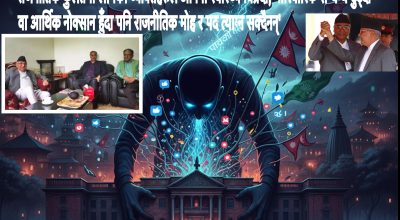
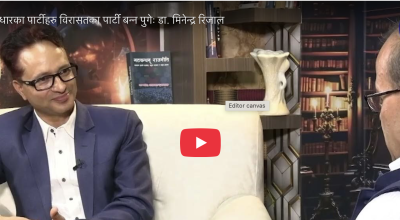
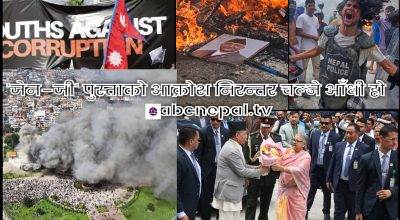
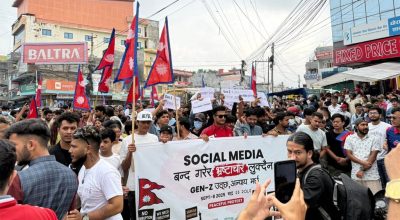
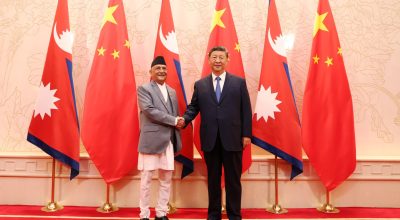
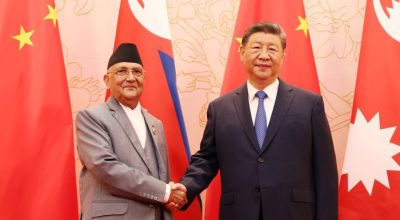
प्रतिक्रिया दिनुहोस्